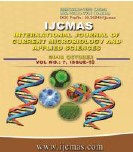


 National Academy of Agricultural Sciences (NAAS)
National Academy of Agricultural Sciences (NAAS)

|
PRINT ISSN : 2319-7692
Online ISSN : 2319-7706 Issues : 12 per year Publisher : Excellent Publishers Email : editorijcmas@gmail.com / submit@ijcmas.com Editor-in-chief: Dr.M.Prakash Index Copernicus ICV 2018: 95.39 NAAS RATING 2020: 5.38 |
Humanity is facing a major challenge in producing enough food from the limited resources for an additional three billion people by 2050. Moreover, the productivity of agricultural crops is adversely affected due to environmental abiotic and biotic stresses. To meet the global food demand, intensive agriculture has resulted in indiscriminate use of chemical fertilizers and pesticides. These agrochemicals and their metabolites have been found to cause pollution in soil, groundwater and atmosphere. To reduce the deleterious effects of these agrochemicals, certain potential microorganisms have been characterized from rhizosphere of different crop plants which can act as biofertilizers and biopesticides. These are considered to be safer alternatives and their application has increased significantly in recent times. Biofertilizers enhance plant growth by a wide variety of mechanisms including phosphate and potassium solubilization, siderophore production, biological nitrogen fixation, production of 1-aminocyclopropane-1-carboxylate (ACC) deaminase and phytohormone production. Biopesticides can control various plant diseases by production of antifungal compounds like antibiotics, siderophores, hydrolytic enzymes, HCN, volatile organic compounds (VOCs) and by induction of systemic resistance. Further, understandings of the different rhizobacteria mediating plant growth promotion mechanisms could be exploited to enhance productivity of crops in sustainable agriculture.
 |
 |
 |
 |
 |